
- ARAB NEWS
- 18 Jul 2025

WASHINGTON: US Secretary of State Mike Pompeo said on Sunday that Iran will probably try to attack American troops after a US strike killed a top Iranian commander.
“We think there is a real likelihood Iran will make a mistake and make a decision to go after some of our forces, military forces in Iraq or soldiers in northeast Syria,” he told Fox News in remarks aired on Sunday.
His comments came as the military adviser to Iran’s supreme leader said there would be a “military” response “against military sites” by Tehran after the US killing of Qasem Soleimani, the powerful commander of Iran’s Quds Force, the foreign operations arm of its Revolutionary Guards.
“It would be a big mistake for Iran to go after them,” Pompeo said.
The US has about 60,000 troops in the region, including around 5,200 in Iraq. Washington ordered thousands more soldiers to the Middle East on Friday after Soleimani’s killing.
“We’re preparing for all kinds of various responses,” including cyberattacks, Pompeo said.
The chief of the Iran-backed Lebanese Shiite group Hezbollah on Sunday also singled out the US army as a target for reprisals after the killing of Soleimani and a senior Iraqi commander.
“The American army killed them and it will pay the price,” said Hassan Nasrallah, who is based in Lebanon.
Outraged by the deadly American drone strike, Iraq’s parliament on Sunday urged the government to end the presence of US-led coalition forces in the country.
They have been there since 2014, when Baghdad invited them in to support local troops fighting the Daesh group.
The Iraqi Cabinet would have to approve any decision but the premier had earlier indicated support for a troop ouster.
“We’ll have to take a look at what we do when the Iraqi leadership and government makes a decision,” Pompeo told Fox when asked whether the US would leave Iraq if the government asks.
US strategy
Pompeo said the US strategy in countering Iran is to target the country’s “actual decision-makers” rather than to focus on Iranian proxy forces in Iraq and elsewhere in the Middle East.
Pompeo was explaining US strategy in the aftermath of the US drone strike that killed Iran’s most powerful general, Qassem Soleimani, who was mastermind of the country’s military operations outside Iran. That killing has sent shock waves across the Middle East, with expectations that Iran will make good on its threat to strike back, with unpredictable consequences for the US and the rest of the world.
Pompeo spoke on ABC’s “This Week” amid rising uncertainty about next steps in the US-Iran crisis and the breadth of its ramifications. The US acknowledged an attack Sunday by an Al-Qaeda affiliate on a Kenyan airfield used by American military forces. It was not immediately clear whether there were US casualties.
In Beirut, Lebanon’s Hezbollah chief, Hassan Nasrallah, said the US military in the region, including bases and warships, were fair targets after the killing of Soleimani. Hezbollah is a primary ally of Iran with broad influence. The US has tens of thousands of troops throughout the region, including in Iraq, Syria, Saudi Arabia, Kuwait and Qatar — all within range of Iran or its proxy militias.
Iraq’s parliament on Sunday called for the expulsion of US troops from the country in the wake of the attack in Baghdad that killed Soleimani. There are 5,200 American forces in Iraq.
At issue is the fate of the agreement under which Washington sent troops to Iraq more than four years ago to help in the fight against the Daesh group.
Meantime, the US coalition combating Daesh in Iraq and Syria announced that it has “paused” training of Iraqi security forces in order to focus on protecting coalition personnel.
Pompeo strongly criticized the Iran policy of the Obama administration, saying it fruitlessly focused on Iranían proxies rather than on Iran itself.
He said the US had previously sought to “challenge and attack everybody who was running around with an AK-47 or a piece of indirect artillery. We’ve made a very different approach. We’ve told the Iranian regime, ‘Enough. You can’t get away with using proxy forces and think your homeland will be safe and secure.’ We’re going to respond against the actual decision-makers, the people who are causing this threat from the Islamic Republic of Iran.”
In that context, Pompeo said that if the US military were to strike inside Iran, in the event Iran retaliated against America for the Soleimani killing, those strikes would be legal under the laws of armed conflict.
“We’ll behave inside the system,” Pompeo said. “We always have and we always will.”
Pompeo was responding to a question about President Donald Trump’s assertion Saturday on Twitter that the US has 52 Iranian targets in its sights, “some at a very high level & important to Iran & the Iranian culture.”
Targeting cultural sites is a war crime under the 1954 Hague Convention for the protection of cultural sites. The UN Security Council also passed unanimously a resolution in 2017 condemning the destruction of heritage sites. Attacks by Daesh and other armed factions in Syria and Iraq prompted that vote.
“Every target that we strike will be a lawful target, and it will be a target designed with a singular mission — defending and protecting America,” Pompeo said. He did not explicitly contradict Trump on targeting cultural sites. In insisting that any US attacks will be legal, Pompeo said Trump “was getting to this point” without making it in his tweet on Saturday.
AFP/AP